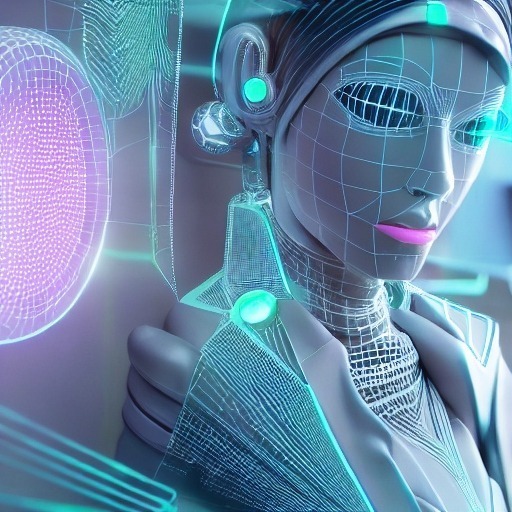Artificial intelligence (AI) is transforming the medical community in many ways, from improving diagnosis and treatment to enhancing patient care and safety. Let’s explore some of the positive impacts of AI on the medical community and how it can benefit both health professionals and patients.
Analyzing Data Advantage
One of the main benefits of AI is its ability to analyze large amounts of data and extract meaningful insights. This can help doctors and researchers to make better decisions, find new patterns, and discover new treatments. For example, AI can help diagnose diseases such as cancer, Alzheimer's, and COVID-19 by analyzing images, scans, or genetic data.
One study found that an AI system could detect breast cancer from mammograms with higher accuracy than human radiologists. Another study showed that an AI algorithm could identify Alzheimer's disease from brain scans up to six years before clinical diagnosis. A third study demonstrated that an AI model could diagnose COVID-19 from chest X-rays with 96% accuracy.
Predicting Outcomes
AI can also help predict outcomes, such as the risk of complications, mortality, or relapse, by using data from electronic health records, clinical trials, or wearable devices. For instance, an AI tool could predict the risk of sepsis in hospitalized patients and alert clinicians to intervene early. Another AI system could forecast the survival of patients with heart failure and help optimize their treatment. A third AI application could monitor the heart rate and oxygen saturation of COVID-19 patients at home and notify doctors if they need urgent care.
A Reliable Partner
Another benefit of AI is its ability to augment human capabilities and assist health professionals in their tasks. For example, AI can help surgeons perform complex operations with more precision and accuracy by providing guidance, feedback, or robotic assistance.
Tests & Surgery
One example is the da Vinci surgical system, which uses AI to enable surgeons to operate through small incisions with enhanced vision, dexterity, and control. Another example is the Mako robotic arm assisted surgery system, which uses AI to plan and execute partial or total knee replacements with less pain and faster recovery. A third example is the Butterfly iQ device, which uses AI to turn any smartphone into an ultrasound machine that can scan any part of the body.
Health Tasks
AI can also help nurses monitor patients' vital signs, alert them to any changes, or provide them with reminders or suggestions. For example, one that many people use today is an AI-powered smartwatch that could detect atrial fibrillation and prompt them to seek medical attention. Another AI-enabled device could measure blood pressure from the finger and send the data to a cloud platform for analysis and feedback. A third AI solution could use voice recognition and natural language processing to transcribe nurses' notes and reduce their documentation burden.
Improved Patient Care
A third benefit of AI is its ability to improve patient care and safety by providing personalized and proactive services. For example, AI can help patients manage their chronic conditions, such as diabetes or hypertension, by providing them with tailored advice, coaching, or interventions. One example is the Livongo platform, which uses AI to collect and analyze data from glucose meters, blood pressure cuffs, or weight scales and provide personalized insights and guidance to patients with diabetes or hypertension. Another example is the Omada Health program, which uses AI to deliver online behavioral counseling and support to patients with obesity or pre-diabetes. A third example is the Lark app, which uses AI to chat with patients and help them track their diet, exercise, sleep, and medication adherence.
Improving Access
AI can also help patients access health information, book appointments, or communicate with their doctors through chatbots or voice assistants. For example, an AI chatbot called Babylon Health could answer health-related questions, triage symptoms, or schedule consultations with doctors. Another AI voice assistant called Nuance Dragon Medical One could allow patients to speak their medical history or concerns and generate a summary for their doctors.
Proactive Assessments
A third AI service called Ada Health could use conversational AI to assess patients' health status and provide personalized advice or referrals. AI can also help patients prevent diseases or detect them early by using sensors, wearables, or smart devices. For example, an AI-powered skin cancer app called SkinVision could scan moles or lesions and estimate their risk of malignancy. Another AI-enabled smart toilet could analyze urine or stool samples and detect signs of infection or disease. A third AI-based wearable device called Oura Ring could measure body temperature, heart rate variability, and sleep quality and alert users to potential signs of illness.
Accepting the Positives
AI is having a positive impact on the medical community by enhancing diagnosis and treatment, augmenting human capabilities, and improving patient care and safety. AI is not a threat to replace human doctors or nurses, but rather a tool to complement and empower them. By embracing AI, the medical community can achieve better outcomes, lower costs, and higher satisfaction for both health professionals and patients.
This is an opinion article by Guido Piraino of The Monthly Social Podcast. It may also be heard on The Path Radio Mix Online. You can read other opinion articles on the blog page. You may also enjoy video content of The Monthly Social Podcast on YouTube or The Path Radio Mix on YouTube. For sports content, please consider The Coach's Call YouTube Podcast.
